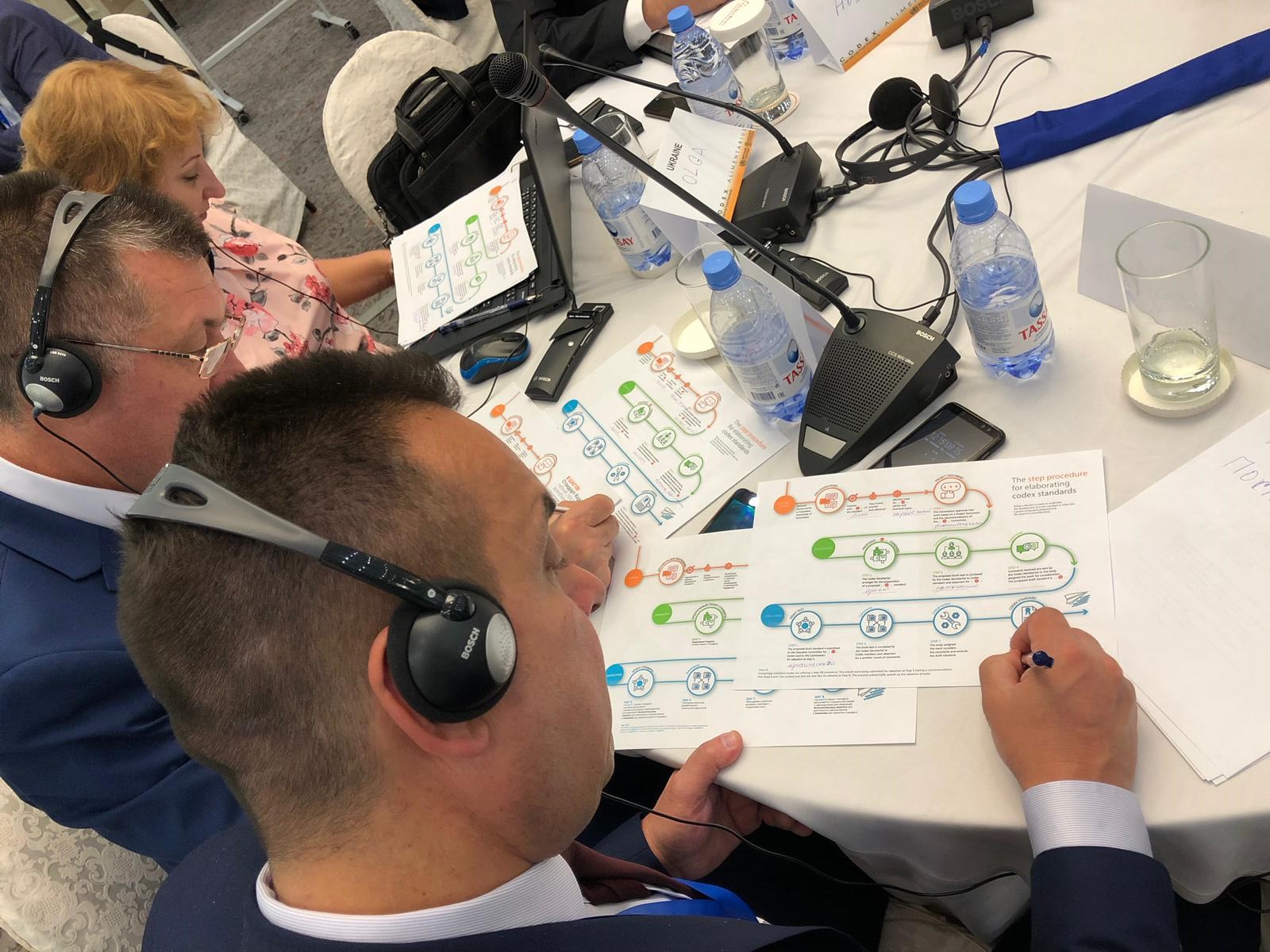Workshop in Europe focuses on Codex Strategic Plan and web tools
Codex Members in the Europe region began a three-day meeting in Almaty, Kazakhstan today to improve their skills and knowledge of the online tools used by the food standard-setting partnership and to discuss the regional priorities to propose including in the Codex Strategic Plan (2020-2025).
Zhandarbek Bekshin of the Ministry of Health of Kazakhstan, the country leading the Codex Coordinating Committee for Europe, opened the session with a call for establishing a joint position on food trade-related matters in the 51 Member countries (and one Member organization, the EU) in the region. “We place great importance on digitalization to facilitate our work and this workshop will allow the region to work in a more coordinated way”, he said.
Representatives of FAO and WHO spoke about the importance of improving the capacities of national Codex systems to operate successfully in the Codex international standard setting environment. “Raising awareness for global food safety has become an urgent and an integral part of the food security agenda”, said Dina Pfeiffer, WHO Medical Officer in the Regional Office for Europe. Mary Kenny, FAO Regional Food Safety and Quality Officer for the region reminded participants that “Codex is a rule and procedure-based organization. Ensuring knowledge of these tools is essential to participate fully in Codex work”.

Analysing the Codex step process for standard setting
Tomorrow the region will turn to formulating coordinated input to provide on the Codex Strategic Plan for 2020-2025, which will be adopted by the 42nd Codex Alimentarius Commission (July 2019). The meeting will also begin to explore the key areas for discussion at the next FAO/WHO Coordinating Committee for Europe, which will be held in October 2019 and include implementation of the Strategic Plan.
The 16 countries from the Balkans, Eastern Europe, the Caucasus and Central Asia present are: Armenia, Azerbaijan, Albania, Belarus, Bosnia and Herzegovina, Georgia, Kazakhstan, Kyrgyzstan, the former Yugoslav Republic of Macedonia, Moldova, Montenegro, Serbia, Tajikistan, Turkmenistan, Turkey, Ukraine and Uzbekistan.
Read more
At the heart of the Codex mandate are the core values of collaboration, inclusiveness, consensus building and transparency. Governmental and non-governmental, public and private organizations alike play a vital role in ensuring Codex texts are of the highest quality and based on sound science.
Codex would have little authority in the field of international standard setting if it did not welcome and acknowledge the valuable contributions made by observers. Expert technical bodies, industry and consumer associations
contribute to the standard-setting process in a spirit of openness, collaboration and transparency.
Intergovernmental organizations (IGOs) and international non-governmental organizations (NGOs) can apply for observer status in Codex in order to attend and put forward their views at every stage of the standard-setting process.
 Current Codex Alimentarius Commission
Current Codex Alimentarius Commission
Workshop in Europe focuses on Codex Strategic Plan and web tools
Codex Members in the Europe region began a three-day meeting in Almaty, Kazakhstan today to improve their skills and knowledge of the online tools used by the food standard-setting partnership and to discuss the regional priorities to propose including in the Codex Strategic Plan (2020-2025).
Zhandarbek Bekshin of the Ministry of Health of Kazakhstan, the country leading the Codex Coordinating Committee for Europe, opened the session with a call for establishing a joint position on food trade-related matters in the 51 Member countries (and one Member organization, the EU) in the region. “We place great importance on digitalization to facilitate our work and this workshop will allow the region to work in a more coordinated way”, he said.
Representatives of FAO and WHO spoke about the importance of improving the capacities of national Codex systems to operate successfully in the Codex international standard setting environment. “Raising awareness for global food safety has become an urgent and an integral part of the food security agenda”, said Dina Pfeiffer, WHO Medical Officer in the Regional Office for Europe. Mary Kenny, FAO Regional Food Safety and Quality Officer for the region reminded participants that “Codex is a rule and procedure-based organization. Ensuring knowledge of these tools is essential to participate fully in Codex work”.

Analysing the Codex step process for standard setting
Tomorrow the region will turn to formulating coordinated input to provide on the Codex Strategic Plan for 2020-2025, which will be adopted by the 42nd Codex Alimentarius Commission (July 2019). The meeting will also begin to explore the key areas for discussion at the next FAO/WHO Coordinating Committee for Europe, which will be held in October 2019 and include implementation of the Strategic Plan.
The 16 countries from the Balkans, Eastern Europe, the Caucasus and Central Asia present are: Armenia, Azerbaijan, Albania, Belarus, Bosnia and Herzegovina, Georgia, Kazakhstan, Kyrgyzstan, the former Yugoslav Republic of Macedonia, Moldova, Montenegro, Serbia, Tajikistan, Turkmenistan, Turkey, Ukraine and Uzbekistan.
Read more
 Codex and Observer
Codex and Observer
around the world since ancient times.
We might not always know where it comes from,
but we expect it to be available, safe and of good quality.









Leave a comment